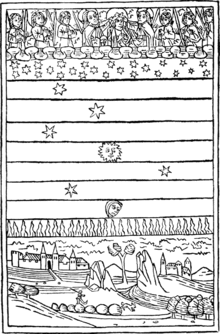https://en.wikipedia.org/wiki/Cyrano_de_Bergerac wrote:
<<Savinien de Cyrano de Bergerac (6 March 1619 – 28 July 1655) was a French novelist, playwright, epistolarian and duelist. Today he is best known as the inspiration for Edmond Rostand's most noted drama Cyrano de Bergerac which, although it includes elements of his life, also contains invention and myth.
Cyrano de Bergerac's works L'Autre Monde: ou les États et Empires de la Lune ("Comical History of the States and Empires of the Moon", published posthumously, 1657) and Les États et Empires du Soleil (The States and Empires of the Sun, 1662) are classics of early modern science fiction.
In part one [of L'Autre Monde (1657)], an attempt to reach the Moon to prove there is a civilization that views Earth as its moon leads the narrator to soar from Paris into the sky by strapping bottles of dew to his person, but he fails and lands back on Earth. Believing to have traveled straight up and down, he is confused by local soldiers who tell him he is in France; they escort him to the provincial governor who informs him that it is in fact New France. The narrator explains to the governor that
all matter is formed inside and expelled from stars, and that once the Sun has run out of fuel it will consume the planets and restart the cycle. He uses New France as evidence for this theory, claiming that its only being discovered not long ago by European explorers was because the Sun had only recently sent it to Earth.
The narrator tries again to construct a way of reaching the Moon, this time through a flying machine that he launches off a cliff's edge. Though the craft crashes, local soldiers attach rockets to it, hoping that it will fly to celebrate the feast day of St. John the Baptist. Dismayed at this use of his machine, the narrator attempts to deconstruct it while the fuse is lit, but the machine takes off and sends him into space. He meets inhabitants who have four legs, musical voices, and amazing weapons that cook game for a meal while it's being shot, as well as the ghost of Socrates and Domingo Gonsales of Francis Godwin's The Man in the Moone. His discussions with Gonsales include how useless of a concept God is, that humans cannot achieve immortality, and that they do not have souls. After these discussions, the narrator returns to Earth.
In part two, a new machine that focuses solar energy through mirrors to generate bursts of air sends the narrator to the Sun. Those living on a Sun spot teach him about the solar system by relating it to how atoms move. Upon the surface of the Sun, he is tried for all the crimes humanity has committed by birds, but one who knows him sets him free. The narrator then discusses with Tommaso Campanella how sex would work in Utopia.>>
 Highest, Tallest, and Closest to the Stars
Highest, Tallest, and Closest to the Stars


